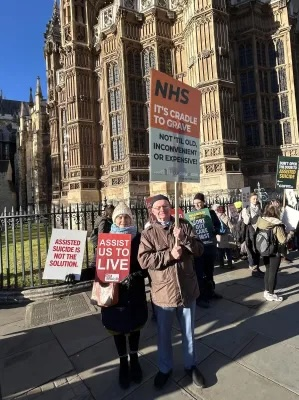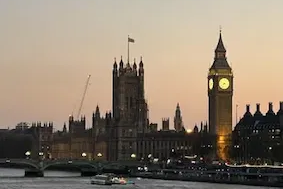Appeal from Care Not Killing

Dr Ray Towey and campaigners Image ICN/JS
Dear Friends,
We are now less than NINE DAYS away from the House of Lords Second Reading debate on Kim Leadbeater's Terminally Ill Adults (End of Life) Bill (Friday 12 September).
Thank you to all those who have have been writing to Peers, and especially to those who have been relaying responses to us - these are hugely important contributions.
If you've not yet had chance to write, now is a crucial moment: there is still time, though only just, to make your message heard by Peers - and yours might be the last they read before going into that debate.
Who to write to?
A huge number of Peers do not have publicly available email addresses, and many who do have no staff to monitor them, so we are encouraging supporters to write hard-copy letters (addressed to House of Lords, London, SW1A 0PW).
You could write to:
The three Peers we recommended earlier in the summer:
The Rt Hon The Lord Rowlands (envelope)
Dear Lord Rowlands
The Rt Hon The Lord Jones (envelope)
Dear Lord Jones
The Rt Hon The Baroness Burt of Solihull (envelope)
Dear Baroness Burt
Peers who used to represent your area, see: Former MPs sitting in House of Lords as MPs, MSPs, MSs or MLAs (with whom you can establish a local connection).
Peers who, like you, lived or studied in a particular town or city (external resource)
See: Write to them
If you've already taken these steps, please encourage friends to follow your lead this week.
What to say?
There is an array of resources for you to draw upon (e.g.), but you might - in your own words - emphasise one or more of these five key points:
1. Some supporters of the Bill have argued that the unelected Lords should not stand in the way of a bill passed by the elected House of Commons, with some invoking what's called the "Salisbury Convention" - but this is not a Government bill, it was not the result of a manifesto pledge, and it only just scraped through the Commons with a very small (and reduced) majority. It would be wholly constitutionally appropriate for the Lords to reject this bill.
2. Supporters of the Bill have urged Parliamentarians not to compare it with Canada's law, which has expanded from terminally ill people to chronically ill and disabled people, with mentally ill people soon to be included and with minors under active consideration; and which resulted in more than 60,000 euthanasia and assisted suicide deaths between 2016-2023. In reality, there are many directly applicable lessons from Canada, and Peers must consider these.
3. Supporters of the Bill frame this debate first and foremost as a matter of choice - but as former Prime Minister Gordon Brown has argued (like many others), assisted dying would not represent real choice "if the alternative option, the freedom to draw on high-quality end-of-life care, is not available."
4. The Bill is based on assessing someone as being within six months of natural death, but such prognoses are notoriously unreliable, and such an arbitrary line will be susceptible to challenges in the courts, and to those who accept limits today to get the Bill passed, coming back in a few short years to remove them. Do Peers consider the six month requirement to be an valuable limit - and do they believe that line could hold?
5. Despite endless claims by activists of overwhelming public support for a change in the law, accepted at face value by too many in the media, the reality - borne out by research - is that public support for a change in the law collapses (to 11%) when ten arguments against are heard.
To stand a good chance of reaching Peers in time, letters should be posted this week.
Do please let us know of any replies you receive, and again, do please encourage friends to follow your lead.
Thank you for all your efforts.
Yours sincerely,
Dr Gordon Macdonald
CEO - Care Not Killing
Daniel Cuffe
Campaign Manager - Care Not Killing


















